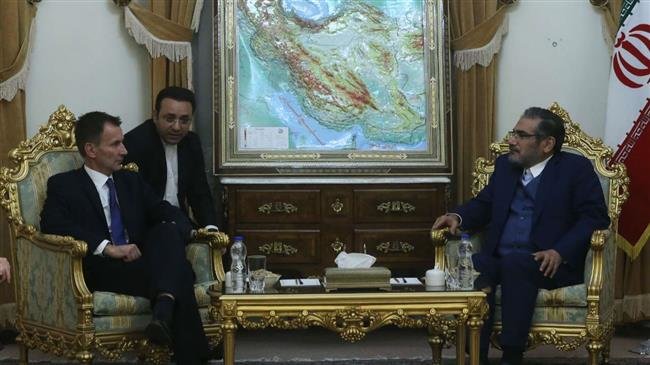UK Foreign Minister Jeremy Hunt with Iran’s Secretary of National Security Council, Ali Shamkhani, November 19, 2018
The visit of UK Foreign Minister Jeremy Hunt to Iran has been overshadowed by tough regime rhetoric and the threat of European Union sanctions, over alleged Iranian assassination and bombing plots in Europe.
Hunt met Iranian counterpart Mohammad Javad Zarif and Iran’s Secretary of the National Security Council, Admiral Ali Shamkhani, on Monday in Tehran. He was expected to raise the state of the 2015 nuclear deal in the face of comprehensive US sanctions, a plan for a ceasefire in the Yemeni civil war, and the detentions of UK citizens including charity worker Nazanin Zaghari-Ratcliffe.
Tehran is looking for UK support as it seeks EU trade and business links to defy the American sanctions, which came into effect on November 5.
Iran Daily, Nov 19: UK Foreign Secretary in Tehran
But in a sign of friction in the discussions, Shamkhani lambasted European states as “accomplices” in US crimes: “Any collaboration of some European countries with policies of Trump’s administration will have negative impacts on long-term relations with our country.”
Shamkhani warned that if European states did not maintain economic links, there will be “a negative view of these countries, in the public opinion of Iranian people and regional nations,…as parties to crimes committed by the US, the Zionist regime, and reactionary [states] in the region.”
The UK and European partners have said they will protect small- and medium-size enterprises, and they are working with Iran on a Special Purpose Vehicle for financial transactions, including for oil purchases, to bypass the US dollar.
But the EU’s inability to guarantee its biggest firms has led many to suspend links with the Islamic Republic. They include the French energy giant Total, French auto manufacturers Peugeot and Renault, Germany’s Siemens and Deutsche Bank, the world’s largest shipper Maersk, and French aircraft manufacturer Airbus.
Shamkhani also criticized the UK for not action against London-based Iranian expatriate media outlets.
Tehran accuses the outlets of stirring up violence, including an attack on a military parade in Ahvaz in September which killed at least 25 people.
“It is expected that the British government explicitly announces its stance on the necessity to counter terrorism and human rights violation,” Shamkhani said.
EU Ministers Back Sanctions Over Claimed Iran Bomb Plot
European Union foreign ministers have supported a French Government decision to sanction Iranian nationals accused of a bomb plot in Paris in June.
The ministers said on Monday that technical work can begin on a freeze of EU assets of two Iranians and Iran’s intelligence service.
The suspects are accused of seeking to bomb a June 30 gathering of the National Council of Resistance of Iran, the political branch of Mujahideen-e-Khalq, which has sought the overthrow of the Islamic Republic since 1979. Guests at the rally included Donald Trump’s lawyer Rudy Giuliani and US politicians such as former Speaker of the House Newt Gingrich.
Denmark is also seeking EU sanctions over its claim that Tehran’s intelligence services are behind the attempted assassination of an Iranian dissident.
Danish officials said last month that a Norwegian suspect of Iranian descent, tied to the intelligence services, sought to kill a leader of the Arab Struggle Movement for the Liberation of Ahvaz.
Germany extradited an Iranian diplomat to Belgium in October, accusing him of involvement in the Paris bomb plot.

